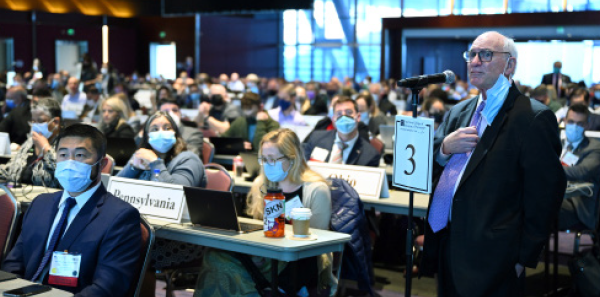
Dr. Kass encourages organizers to not only look for diversity in backgrounds but also diversity in thought. In 2018, for example, she organized a conference that included a lecture about reducing gun violence and recruited a politically conservative speaker who also owned guns. The other speakers did not meet this profile, and she wanted several different ideas to be presented.
Sometimes organizations need to provide financial support for inclusion goals. Dr. Kass feels it’s important to recruit speakers from underrepresented groups who might not have the resources or time off to travel to a meeting. “Collecting demographic data is one thing, but removing barriers, like paying for meeting travel, takes diversity and inclusion efforts to a higher level.”
Resolution 31: Employment-Retaliation, Whistleblower, Wrongful Termination
Resolution 31 is a response to accounts of emergency physicians being fired because of public comments they made about working conditions during the height of the COVID-19 pandemic. This resolution was submitted by Olga Gokova, MD, FACEP; Rebecca Parker, MD, FACEP; Amish Shah, MD, FACEP; and the Arizona College of Emergency Physicians.

William J. Naber, MD, JD
A few notable examples on this topic include Cleavon Gilman, MD, who was dismissed from his job at Yuma Regional Medical Center in Yuma, Arizona, because of tweets he sent in November 2020 about the surge of COVID-19 patients, according to the Arizona Republic. In one tweet, he said he was notified that all of the hospitals in Arizona were out of ICU beds.1
In March 2020, emergency physician Ming Lin, MD, was fired by PeaceHealth St. Joseph Medical Center in Bellingham, Washington, after he publicly described what he felt were unsafe practices by the hospital. He complained, for example, that patients were being screened for COVID-19 inside the hospital rather than outside, where there was less of a risk of the virus spreading, The Seattle Times reported.2
Legislators in Arizona reacted to Dr. Gilman’s case by introducing Arizona House Bill 2622.3 The bill prohibits retaliation against a health professional who reports a safety, harassment, or fraud concern to a health care institution and, “having provided the health care institution a reasonable opportunity to address the report, provides information to a private health care accreditation organization or governmental entity concerning the activity, policy or practice that was the subject of the report.” The bill also prohibits third-party contractors from taking retaliatory action against health care professionals who make such reports.
The ACEP Council adopted the resolution to submit a resolution to the June 2022 American Medical Association (AMA) House of Delegates Annual Meeting, “promoting the concepts of Arizona House Bill 2622 (2021).” The resolution also states the College will develop model legislation fashioned after the Arizona bill, which it will share with all ACEP chapters.
William J. Naber, MD, JD, associate professor of emergency medicine at the University of Cincinnati College of Medicine and associate chief medical officer at UC Health, said he likes that the Arizona bill basically asks health care professionals to first work within their institutions to address concerns.
“If I had a patient safety concern at my institution, we have so many avenues to work internally within the health care system to fix things,” he explained. “It would have to be a very significant event that goes unaddressed to turn externally [to the press or social media] to try to fix something.” Dr. Naber was not involved in the ACEP resolution or the Arizona bill.
He said that emergency physicians should receive whistleblower protection if they have exhausted all internal systems for addressing quality or safety concerns. After that, emergency physicians can turn to The Joint Commission or their state health department. Posting about the issue on social media should be a final resort, said Dr. Naber.
“You always you want a non-retaliatory feeling and culture of safe reporting at your institution; otherwise, people won’t report events if they are afraid of retaliation,” said Dr. Naber.
Resolution 47: Family and Medical Leave
Pages: 1 2 3 4 | Single Page






No Responses to “ACEP Council Resolutions Tackle Key Issues”